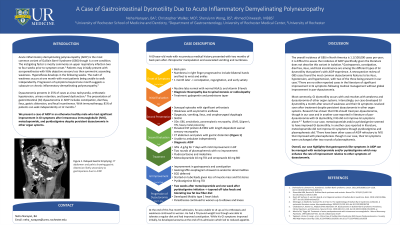Tuesday Poster Session
Category: Stomach
P4230 - A Case of GI Dysmotility Due to Acute Inflammatory Demyelinating Polyneuropathy
Tuesday, October 24, 2023
10:30 AM - 4:00 PM PT
Location: Exhibit Hall

Has Audio

Neha Narayan, BA
University of Rochester
Rochester, NY
Presenting Author(s)
Neha Narayan, BA1, Christopher Walker, MD2, Sherylynn Wong, BS1, Ahmed Dirweesh, MBBS2
1University of Rochester, Rochester, NY; 2University of Rochester Medical Center, Rochester, NY
Introduction: Acute inflammatory demyelinating polyneuropathy (AIDP) is rare disorder that may be associated with GI dysmotility in some patients. The timeline for the improvement in dysautonomia is variable but often occurs in concert among organ systems. We present a case of AIDP in an otherwise healthy male who noted significant improvement in GI symptoms after IVIG and metoclopramide despite persistent dysautonomia in other organ systems.
Case Description/Methods: A 60-year-old previously healthy male presented with 2 months of numbness, orthostatic hypotension, syncope, nausea, vomiting, anorexia and weight loss. His labs were notable for hyponatremia which was attributed to SIADH. Serologic studies looking for an etiology from infections, metabolic derangements, autoimmune diseases or micronutrient deficiencies were normal. CSF analysis was notable for an elevated protein of 54. MR imaging of the brain and spine were normal as were CT scans of the chest, abdomen and pelvis. EMG/NCS demonstrated a moderate, distally accentuated and predominantly sensory polyneuropathy. The patient was diagnosed with AIDP and treated with 7 days of IVIG. His hypotension was treated with fludrocortisone and midodrine.
The patient’s GI symptoms were treated with metoclopramide 10 mg TID. Tube feeds were later started given malnutrition with moderate loss of muscle mass and fat stores. Symptoms persisted while on tube feeds; the patient was unable to tolerate the goal rate of feeds until the 7th day. Two weeks after starting metoclopramide, the tube feeds were gradually tapered and the patient was tolerating frequent small, low-fat, low-fiber meals. Weeks later, the patient was able to increase oral nutrition to allow for adequate caloric intake. Despite improvement in GI symptoms within the first few weeks of being diagnosed with AIDP, other symptoms of dysautonomia remained present for 3 months.
Discussion: Gastroparesis, paralytic ileus and diarrhea are among the different forms of GI dysmotility that patients with AIDP experience. Often, these symptoms progress and resolve concurrently with weakness, hypotension and other common signs and symptoms of AIDP. The literature to date does not demonstrate a significant improvement in GI symptoms following medical management without global improvement in dysautonomia. This case highlights that gastroparesis-like symptoms in AIDP can be managed with metoclopramide which may enhance the rate of improvement relative to other symptoms of dysautonomia.
Disclosures:
Neha Narayan, BA1, Christopher Walker, MD2, Sherylynn Wong, BS1, Ahmed Dirweesh, MBBS2. P4230 - A Case of GI Dysmotility Due to Acute Inflammatory Demyelinating Polyneuropathy, ACG 2023 Annual Scientific Meeting Abstracts. Vancouver, BC, Canada: American College of Gastroenterology.
1University of Rochester, Rochester, NY; 2University of Rochester Medical Center, Rochester, NY
Introduction: Acute inflammatory demyelinating polyneuropathy (AIDP) is rare disorder that may be associated with GI dysmotility in some patients. The timeline for the improvement in dysautonomia is variable but often occurs in concert among organ systems. We present a case of AIDP in an otherwise healthy male who noted significant improvement in GI symptoms after IVIG and metoclopramide despite persistent dysautonomia in other organ systems.
Case Description/Methods: A 60-year-old previously healthy male presented with 2 months of numbness, orthostatic hypotension, syncope, nausea, vomiting, anorexia and weight loss. His labs were notable for hyponatremia which was attributed to SIADH. Serologic studies looking for an etiology from infections, metabolic derangements, autoimmune diseases or micronutrient deficiencies were normal. CSF analysis was notable for an elevated protein of 54. MR imaging of the brain and spine were normal as were CT scans of the chest, abdomen and pelvis. EMG/NCS demonstrated a moderate, distally accentuated and predominantly sensory polyneuropathy. The patient was diagnosed with AIDP and treated with 7 days of IVIG. His hypotension was treated with fludrocortisone and midodrine.
The patient’s GI symptoms were treated with metoclopramide 10 mg TID. Tube feeds were later started given malnutrition with moderate loss of muscle mass and fat stores. Symptoms persisted while on tube feeds; the patient was unable to tolerate the goal rate of feeds until the 7th day. Two weeks after starting metoclopramide, the tube feeds were gradually tapered and the patient was tolerating frequent small, low-fat, low-fiber meals. Weeks later, the patient was able to increase oral nutrition to allow for adequate caloric intake. Despite improvement in GI symptoms within the first few weeks of being diagnosed with AIDP, other symptoms of dysautonomia remained present for 3 months.
Discussion: Gastroparesis, paralytic ileus and diarrhea are among the different forms of GI dysmotility that patients with AIDP experience. Often, these symptoms progress and resolve concurrently with weakness, hypotension and other common signs and symptoms of AIDP. The literature to date does not demonstrate a significant improvement in GI symptoms following medical management without global improvement in dysautonomia. This case highlights that gastroparesis-like symptoms in AIDP can be managed with metoclopramide which may enhance the rate of improvement relative to other symptoms of dysautonomia.
Disclosures:
Neha Narayan indicated no relevant financial relationships.
Christopher Walker indicated no relevant financial relationships.
Sherylynn Wong indicated no relevant financial relationships.
Ahmed Dirweesh indicated no relevant financial relationships.
Neha Narayan, BA1, Christopher Walker, MD2, Sherylynn Wong, BS1, Ahmed Dirweesh, MBBS2. P4230 - A Case of GI Dysmotility Due to Acute Inflammatory Demyelinating Polyneuropathy, ACG 2023 Annual Scientific Meeting Abstracts. Vancouver, BC, Canada: American College of Gastroenterology.
